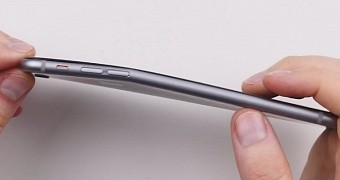iPhone 6’s bending problem, known by many as Bendgate, is the subject of a class-action lawsuit that brought to light details proving Apple actually knew about the issue even before the launch of the device, but decided to release it anyway.
Officially, Apple has never admitted that the iPhone 6 and the iPhone 6 Plus were bendy, despite the plethora of reports coming from customers across the world. Devices hitting this issue often experienced unresponsive touchscreen, a problem in its turn caused by the frame of the phone bending.
While a confirmation has never been offered, Apple quietly fixed the problem without actually telling customers that their devices were faulty. Instead, Apple launched a replacement program that allowed buyers to have their phones exchanged with new units for $149.
But according to U.S. District Court Judge Lucy Koh, Apple was aware that the iPhone 6 was bendy before the official launch, but the company ignored its own internal tests and decided to launch the device to the market.
Writing in an opinion as part of the case, Koh explains that “one of the major concerns Apple identified prior to launching the iPhones was that they were ‘likely to bend more easily when compared to previous generations.’”
As reported by Motherboard, Apple’s internal testing revealed that the iPhone 6 was 3.3 times more likely to bend than the iPhone 5s. iPhone 6 Plus was 7.2 times more likely to experience the same damage than the iPhone 5s.
Apple: iPhone 6 does not have a bending problem
Apple, however, has never acknowledged the problem and even claimed that the touch issue, and consequently the bending, was the result of iPhones being “dropped multiple times on a hard surface and then incurring [sic] further stress on the device.”
Furthermore, Apple rolled out a press statement in September 2014 to deny the bending problem, explaining at that point that its own tests proved the device did not have a structural problem.
“[Apple] perform[s] rigorous tests throughout the entire development cycle including 3-point bending, pressure point cycling, sit, torsion, and user studies. iPhone 6 and 6 Plus meet or exceed all of our high quality standards to endure everyday, real life use,” the company said.
The Cupertino-based tech giant reiterated the same idea during the lawsuit, the cited source adds, and is now trying to convince the judge to deny the class action certification.
The internal documents were shared as part of the lawsuit and prove that Apple actually knew the devices were faulty, while also suggesting the information included in this press release was not accurate.

 14 DAY TRIAL //
14 DAY TRIAL //